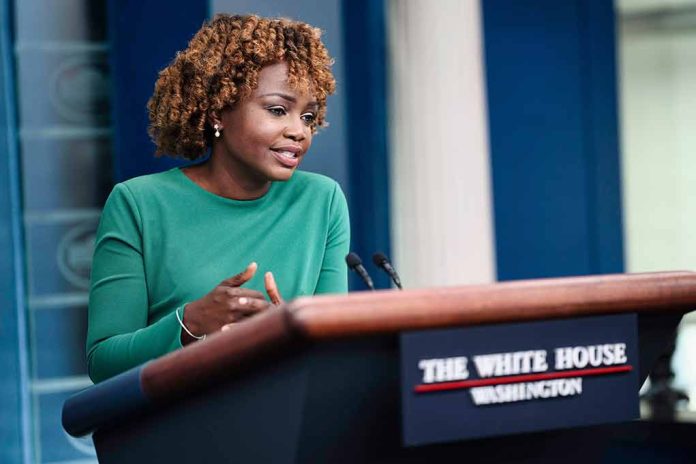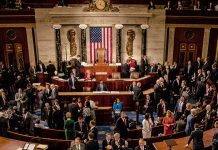
President Biden’s pardon of his son Hunter ignites a political firestorm, challenging White House Press Secretary’s credibility.
At a Glance
- President Biden pardoned his son Hunter, contradicting earlier promises
- White House Press Secretary Karine Jean-Pierre has faced tough questions about the pardon
- Republicans condemn the move, while some Democrats also express disapproval
- The pardon reignites debate on presidential pardon powers and political motivations
Biden’s Pardon Decision Sparks Controversy
President Joe Biden’s recent decision to grant a “full and unconditional pardon” to his son Hunter Biden has set off a political firestorm in Washington. The move, which contradicts Biden’s earlier promises not to interfere in his son’s legal matters, has put White House Press Secretary Karine Jean-Pierre in the difficult position of defending the administration’s actions.
The pardon covers potential crimes committed by Hunter Biden over a 10-year period, including federal gun charges and tax evasion. President Biden justified his decision by citing concerns about political interference leading to a miscarriage of justice. However, this explanation has been met with skepticism from both sides of the political aisle.
Press Secretary’s Challenging Defense
Karine Jean-Pierre, facing intense scrutiny from the press corps, has struggled to reconcile the administration’s previous statements with the current situation. When pressed about the apparent contradiction, Jean-Pierre attempted to redirect attention to the President’s official statement by saying “The president took an action because of how politically infected these cases were,” attempting to defend the administration’s position.
Despite her efforts, Jean-Pierre’s responses have been criticized as evasive, with some accusing the administration of dishonesty. The press secretary’s difficulty in providing clear answers has only fueled further speculation about the motivations behind the pardon.
White House press secretary Karine Jean-Pierre says President Biden decided to pardon his son, Hunter Biden, this weekend after wrestling with the decision.
“The president believed enough is enough,” Jean-Pierre told reporters. https://t.co/qaWxYh4z43
— NBC Politics (@NBCPolitics) December 2, 2024
Political Fallout and Bipartisan Criticism
The fallout from Biden’s decision has been swift and widespread. Republicans have condemned the move as a partisan maneuver, with some accusing the President of abusing his power. Senator Chuck Grassley expressed his disappointment on social media, stating, “I’m shocked Pres Biden pardoned his son Hunter bc he said many many times he wouldn’t & I believed him Shame on me.”
Even some Democrats have voiced their disapproval. Representative Greg Stanton (D-Ariz.) publicly disagreed with the pardon, emphasizing that Hunter Biden’s conviction was not politically motivated. This bipartisan criticism highlights the controversial nature of the President’s decision and its potential impact on public trust in the justice system.
Implications for Presidential Pardon Powers
The controversy surrounding Hunter Biden’s pardon has reignited discussions about the scope and implications of presidential pardon powers. Some lawmakers, including Representative Gerry Connolly, have expressed concern about the broad nature of these powers.
This debate raises questions about the potential for abuse of power and the need for checks and balances in the presidential pardon process. As the political landscape continues to shift, the implications of this decision may have far-reaching consequences for the Biden administration and future presidencies.
Sources:
Hunter Prosecutor Says ‘No Evidence’ of Persecution, Objects to Charges Dismissal
Karine Jean-Pierre gives word salad after being asked about Biden’s pardon of Hunter














